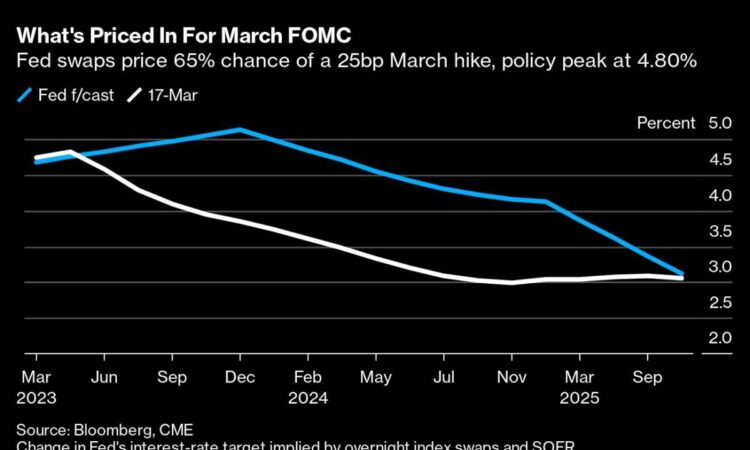
(Bloomberg) — Currency markets fluctuated after Switzerland brokered a rescue of Credit Suisse Group AG, with traders weighing the deal’s impact on the Federal Reserve’s monetary-tightening path.
Most Read from Bloomberg
The yen slipped against the dollar following a choppy open after UBS Group AG agreed to buy its rival bank for about $3.2 billion. The Swiss franc was little changed.
While the news initially calmed traders’ worries about the stability of the financial system, their focus quickly turned to the Fed’s interest-rate decision Wednesday. They debated whether this left officials free to pursue an aggressive policy or whether continuing macro worries will slow that path as markets bet last week.
UBS to Buy Credit Suisse in $3.3 Billion Deal to End Crisis
There “is a risk that financial conditions could tighten so much it causes a sharply disinflationary hard landing,” wrote Sharon Zollner, chief economist, and David Croy, strategist, at ANZ Bank New Zealand Ltd. “But it’s also a risk that things could be just wobbly enough that central banks will find themselves unable to raise policy rates sufficiently to root out inflation before it becomes truly embedded.”
Swap markets last week indicated around a two-in-three chance that the Fed would opt to push ahead with a quarter-point increase, although pricing suggested that it’s likely to end its tightening cycle there. At the height of bank stress concerns earlier in the week, traders had lowered the odds of a quarter point hike to less than half while some banks changed their calls to expect no rate hike.
The yen fell 0.2% against the dollar after earlier trading in a range as wide as 85 pips. The Swiss franc was down 0.1% against the greenback and slid 0.2% against the euro.
The yen is sensitive to the repricing of Fed rate policy and US bond yields, so the moves “may be in anticipation of what that may do to Fed curve pricing this week,” said Mazen Issa, a senior strategist at TD Securities in New York. Still, it’s “very early to tell right now given liquidity,” he said.
As for the Swiss currency, it has lost some of its haven appeal amid the recent turmoil, and traders have turned to the yen as their main target in their flight to safety.
“While markets digest the news and the deal remains in this contingent stage, the Swiss franc is unlikely to act as the cleanest haven expression,” said Simon Harvey, head of FX analysis at Monex. “Instead, we’ll be monitoring credit-default swaps spreads and UBS’s share price when discussing the franc in the immediate term.”
UBS’s all-share deal is priced at a fraction of Credit Suisse’s $8 billion valuation at the close on Friday and it remains to be seen whether it can contain the crisis of confidence. Meanwhile, Californian authorities are working on a break-up of the collapsed Silicon Valley Bank.
UBS to Buy Credit Suisse in Historic Deal to End Crisis
Volatility skyrocketed last week as fears spread about the health of the global financial system amid the effects of the Fed’s yearlong campaign to fight inflation. Concern about potential contagion sent investors scurrying for haven assets and forced a radical rethink about how tight central banks will be able to keep policy.
Front-end Treasury yields were whipsawed by more than 20 basis points every day as investors plowed cash into US securities. US bank equities took a beating and technology stocks turned out to be something of a refuge.
Meanwhile, in a sign that central banks are looking at other means to ensure the stability of the financial system, the Fed and five other central banks announced coordinated action to boost liquidity in their standing US dollar swap arrangements.
“This is still a fragile risk environment,” said Viraj Patel, a global macro strategist at Vanda Research. “I doubt anyone will be putting on risk in size whilst we’re all figuring out the ramifications.”
–With assistance from Alice Gledhill and Michael G. Wilson.
(Updates yen move in second paragraph, currencies in fifth paragraph.)
Most Read from Bloomberg Businessweek
©2023 Bloomberg L.P.



